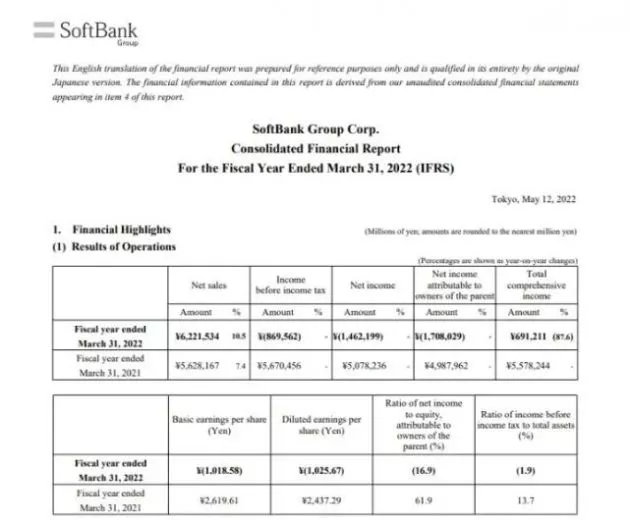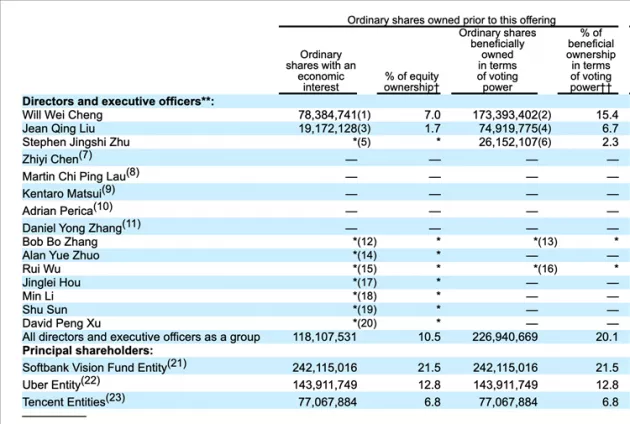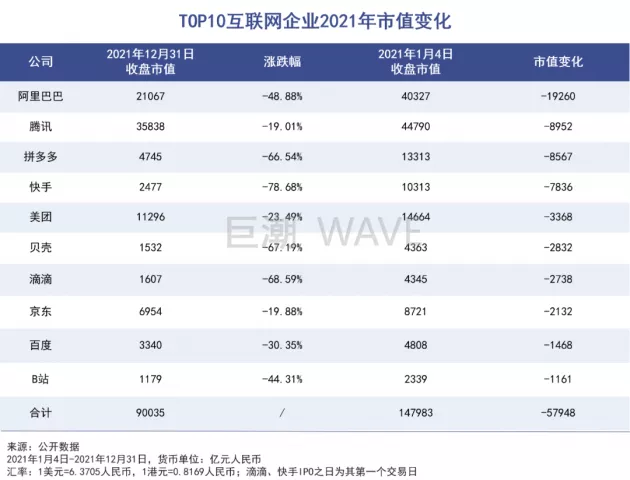"The ups and downs of life are too fast. It's really exciting!" This sentence is perfect for sun Zhengyi. The performance of Softbank group has fluctuated sharply in recent years, flying freely on the track of "W curve" like a roller coaster In fiscal 2017, Softbank's revenue was 9158.8 billion yen (about US $83.562 billion), an increase of 3% over the previous year; The net profit was 1039 billion yen (about US $9.479 billion), down 27% from the previous year.
In fiscal year 2018, Softbank's revenue was 9602.2 billion yen (about US $87.361 billion), an increase of 4.8% over the previous year; The net profit was 141.12 billion yen (about US $12.839 billion), an increase of 35.8% over the previous year.
In fy2019, Softbank's net loss attributable to shareholders of Softbank's parent company was 961.576 billion yen (about US $8.973 billion).
In fiscal year 2020, Softbank created the best report card in history: net profit of 5.08 trillion yen (about 39 billion US dollars).
According to the law of "W curve", as expected, on May 12, 2022, son Zhengyi announced the latest financial report of Softbank group in Tokyo, Japan: as of March 31, the net loss of Softbank group in fiscal year 2021 was 1.7 trillion yen (about 90 billion yuan).
This performance has become the worst performance of Softbank in history and the largest loss in the history of venture capital
Softbank's vision fund had a net loss of 2.64 trillion yen (about 140 billion yuan) in fiscal year 2021, pulling the whole group into the pit on its own.

The news caused an uproar at home. For nothing else, just for sun Zhengyi, the name of China's investment specialist, is enough to attract the eye.
After Alibaba's initial investment of US $20 million, Ma Zhengyi has made a profit of more than US $20 million. With this super big case, son Zhengyi favored the Chinese market. Son Zhengyi said publicly in August last year that 23% of the vision fund's investment is in China.
But just like a song that says "it took all my luck to meet you in the moment of my life". After Alibaba, son Zhengyi has few highlights in China.
On the contrary, Chinese enterprises also contributed a lot to the 140 billion loss of sun Zhengyi vision fund.
1. "Three pits"
For a moment, it seemed that China's Internet enterprises had changed their face to sun Zhengyi.
According to Softbank's financial report, the first three losses of vision fund phase I come from Didi, Wework and grab, and the first three losses of vision fund phase II come from Wework, JD logistics and dingdong shopping.
Among the five enterprises, Chinese enterprises account for three. Didi Jingdong dingdong, the three companies have become "three heroes of Keng soft".
The vision of didi company is "a world-class technology company leading the transformation of automobile and transportation industry".
It is this vision that attracted Softbank's vision fund.
In 2017, Softbank invested $8 billion in Didi. In September of the same year, Softbank invested US $639 million to acquire 5% equity of Alibaba in didi travel.
In 2019, Didi established its wholly-owned subsidiary, Shanghai didi woya Technology Co., Ltd. (didi woya), whose business scope includes technology development in the field of intelligent driving vehicle technology, autonomous vehicle technology, auto parts technology, etc. In 2020, Softbank made another generous contribution, with a lead investment of US $500 million.
According to media reports, Softbank has invested about US $12 billion in Didi. According to Didi's prospectus, Softbank holds 21% of Didi's shares and becomes the largest shareholder.

Originally, Softbank expected this investment to become another classic "model play" after Alibaba. Until June 30, 2021, Didi was listed in the United States, and the farce appeared, which ruined everything.
In 2021, Didi's share price nearly halved. Since 2022, Didi's share price has fallen by about 70%, from the highest 18 yuan at the beginning of listing to one tenth of today. Up to now, Didi's market value is only about $7 billion. According to its 21% shareholding, Softbank has only about $1.5 billion left from its original $12 billion, with a huge loss of more than $10 billion.
Similar to Didi's situation is JD logistics.
Before listing, Softbank subscribed 115 million offer shares at HK $40.36 per share, with a subscription amount of US $600 million (about HK $4641.4 million), becoming a cornerstone investor. On May 28, 2021, JD logistics was successfully listed on the Hong Kong stock exchange, and its opening share price once rose by more than 18%. The market value once exceeded HK $270 billion.
Similarly, the good time is not long. A month later, JD logistics is estimated to continue to decline. As of yesterday, in less than a year, the share price of JD logistics was only HK $14.94, with a market value of less than 100 billion. Softbank investment is only 30%.
On May 12, 2021, dingdong shopping announced that it had completed the round D + financing of US $330 million. Softbank capital invested US $330 million exclusively. According to the 20-F document submitted by Ding Dong to the US SEC recently, SVF II cortex Subcom of Softbank holds 5.9%.
On June 29, 2021, dingdong shopping was listed on the New York Stock Exchange at an issue price of $23.50. On the second trading day of listing, Ding Dong's share price soared by 62.84% to 38.3 yuan, with a market value approaching 10 billion US dollars.
If time can be fixed on this day, Softbank will benefit more than 50% on that day. But beauty is always short-lived. Since then, dingdong shopping has fallen into the same curve as other Internet stocks, falling nearly 30% that year. Since 2022, it has fallen by nearly 70%.
In fact, not only the above-mentioned "three giants" have been digging holes for Softbank, but also Alibaba, which once brought a 2900 times return to Softbank, once lost more than 50% of its share price in the past year.
For a moment, it seemed that China's Internet enterprises had changed their face to sun Zhengyi.
2. Lost to the times
It is this era that really defeated sun Zhengyi.
2021 is an unfriendly year for Internet enterprises, especially for domestic Internet enterprises. It is a contrast from "mountain to top, I am the peak" to "the Milky way falls nine days".
In 2021, when the COVID-19 in China has been basically controlled, most Internet enterprises have started a wave of "online epidemic", falling endlessly. The decline was 20% to the bottom, and even nearly 80% for Kwai.

Even if time can come back, son Zhengyi, who is good at investing in Internet enterprises, will not change the outcome of huge losses no matter how he chooses in China in 2021.
Therefore, sun Zhengyi was not defeated by Chinese enterprises. It is this era and the era when China's Internet ended its rapid development that really defeated sun Zhengyi.
The emergence and popularization of Internet technology is not responsible for improving social productivity in essence. But through more convenient information circulation to improve social production efficiency and drive the "bloated world" to operate more efficiently.
With the popularization of the Internet, the information circulation function of the Internet is gradually released to the maximum power, and its role in promoting the society is gradually weakened. However, China's Internet enterprises have continued the habit of running for the past few decades, which eventually led to disaster.
In terms of operation, the profitability of Internet companies has begun to be stretched. After more than ten years of fighting, the marginal effect of scale expansion has gradually weakened, and the ceiling of market capacity has emerged.
The situation of a group of "sharing economy" Internet enterprises represented by didi is worse. Didi's operating revenue in fiscal year 2021 was 173.827 billion yuan, up 22.64% year-on-year. However, due to multiple reasons, its net profit was a loss of 50.031 billion yuan, down 368.44% year-on-year;
Meituan also fell into the strange circle of increasing revenue without increasing profit. Its revenue in 2021 was 179.1 billion yuan, an increase of 56% over 114.795 billion yuan in the same period last year, but its adjusted loss in 2021 was 15.57 billion yuan.
In the 2021 Q4 earnings conference call, meituan CEO Wang Xing pointed out that since the company's Q4 distribution service revenue is 14.3 billion yuan, far lower than the related cost of 18.3 billion yuan, takeout distribution itself is equivalent to "losing one yuan per order".
Revenue has reached 100 billion level, still worried about making money. Chinese Internet enterprises are constantly "rolling around" in all walks of life in such anxiety. Naturally, the capital market sees it in the eyes, and the decline of valuation is inevitable. However, no one thought that the market value of these large enterprises prone to hundreds of billions and trillions would fall so fast.
3. Write at the end
In the first quarter of 2022, the decline of Chinese Internet enterprises still shows no sign of bottoming out. The giants with unlimited scenery in the past are still struggling in the vortex of performance, policy and epidemic situation. Son Zhengyi also saw such a dilemma and said that Softbank would be more defensive and more cautious in new investment in China.
But today's rout is not a return of value - although it has been over corrected.
According to sun Zhengyi's "W-curve law", after the huge loss in 2021, it may hit the bottom and reverse in 2022.
However, 2022 is about to be more than half, and this law may be broken. Like the bursting of the Internet foam in 2000, son Zhengyi's radicalization and madness have brought him another failure.